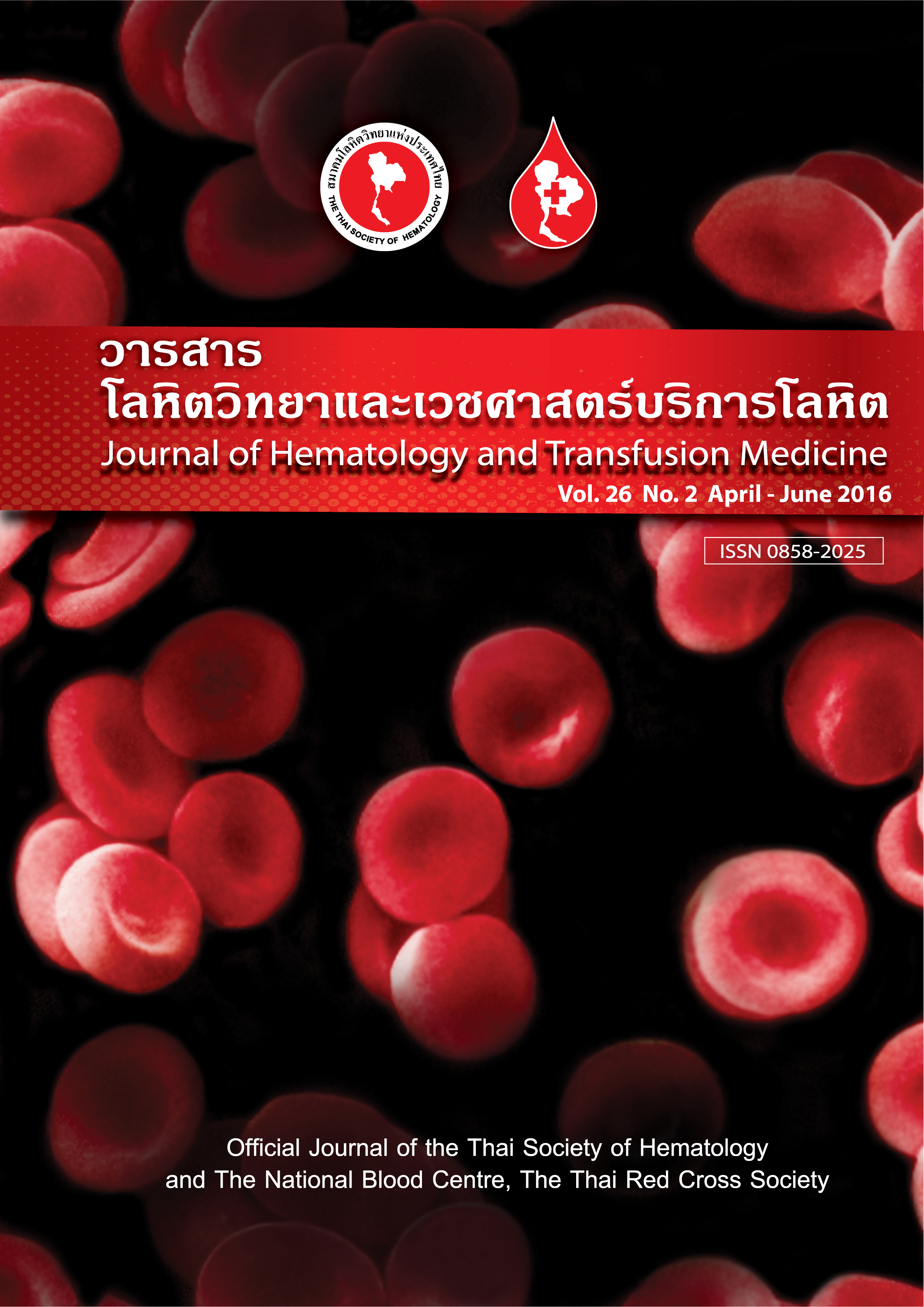ผลกระทบของอาหารต่อการตรวจทางโลหิตวิทยา
Keywords:
CBC, Fasting or food intake postprandial variationAbstract
บทคัดย่อ ปัจจัยมากมายที่ส่งผลกระทบต่อผลการวิเคราะห์ทางห้องปฎิบัติการ การอดอาหารเป็นปัจจัยหนึ่งที่มีความสำคัญต่อหลายการทดสอบในเลือด โดยเฉพาะการตรวจทางเคมีคลินิก อย่างไรก็ตามยังไม่มีความชัดเจนว่าการรับประทานอาหารมีผลกระทบต่อการทดสอบทางโลหิตวิทยา ดังนั้นการศึกษาถึงผลกระทบของอาหารต่อการวิเคราะห์ทางโลหิตวิทยาจึงมีประโยชน์ต่อแพทย์ในการแปลผลและติดตามการรักษาผู้ป่วย วัตถุประสงค์ เพื่อศึกษาถึงผลกระทบของอาหารต่อการวิเคราะห์ทางโลหิตวิทยา วัสดุและวิธีการศึกษา อาสาสมัครสุขภาพดี 30 คน อดอาหารในคืนก่อนการเจาะเลือดอย่างน้อย 10 ชั่วโมง หลังจากผู้วิจัยเจาะเลือดอาสาสมัครก่อนรับประทานอาหารเพื่อตรวจวิเคราะห์ความสมบูรณ์ของเม็ดเลือดแล้ว (complete blood count, CBC) ให้อาสาสมัคร 15 คนรับประทานอาหารที่มีแคลอรี่ต่ำ(280 kcal) และ 15 คนที่เหลือ รับประทานอาหารที่มีแคลอรี่สูง (910 kcal) จากนั้นเจาะเลือดอาสาสมัครทุกคนอีกหลังจากรับประทานอาหารแล้ว 1, 2 และ 4 ชั่วโมงเพื่อวิเคราะห์ค่า CBC ผลการศึกษา พบว่าอาสาสมัครกลุ่มที่รับประทานอาหารแคลอรี่สูงและกลุ่มที่รับประทานอาหารแคลอรี่ต่ำมีการเพิ่มจำนวน neutrophils อย่างมีนัยสำคัญเมื่อเปรียบเทียบกับผลตรวจเลือดในภาวะอดอาหาร โดยอาสาสมัครที่รับประทานอาหารแคลอรี่สูงพบการเพิ่มจำนวน neutrophils ประมาณร้อยละ 7 อย่างมีนัยสำคัญหลังรับประทานอาหารแล้ว 1 ชั่วโมง และเพิ่มขึ้นเป็นร้อยละ 16 ที่ 4 ชั่วโมง เมื่อเปรียบเทียบกับผลตรวจเลือดในภาวะอดอาหาร ส่วนกลุ่มที่รับประทานอาหารแคลอรี่ต่ำตรวจพบการเพิ่มจำนวน neutrophils ที่ 2 ชั่วโมง ร้อยละ 11 และ 4 ชั่วโมง ร้อยละ 33 ตามลำดับ ในทางตรงข้ามจำนวนเม็ดเลือดแดง ค่าฮีโมโกลบินและฮีมาโตคริตลดลงประมาณร้อยละ 1-3 ในอาสาสมัครทั้งสองกลุ่มหลังรับประทานอาหารแล้ว 1 ชั่วโมง จนถึง 4 ชั่วโมง สรุป จากการศึกษาครั้งนี้แสดงให้เห็นว่าชนิดของอาหารมีผลกระทบต่อการเปลี่ยนแปลงค่าพารามิเตอร์ต่างๆ ทางโลหิตวิทยาซึ่งไม่ส่งผลกระทบต่อการแปลผลการตรวจทางโลหิตวิทยา
Abstract:
Background: Many pre-analytical factors have been shown to affect laboratory test results. Fasting is an important factor required for blood collection especially for blood chemistry testing. Usually, blood samples for hematological testing do not require fasting status. However the effect of food intake on routine hematological blood test has not been clearly investigated. Therefore, to study the effect of food intake on routine hematological blood tests is useful for doctors to interpret and monitor patients. Objective: To study the effects of food intake on parameters of routine hematological tests. Material and Methods: Thirty healthy volunteers were enrolled in the study. K2EDTA blood was collected for complete blood count (CBC) from each volunteer after 10 hours fasting. Then 15 participants were assigned to take a light meal (approximately 280 kcal) while the rest took a heavy meal (approximately 910 kcal). Blood samples were recollected from all volunteers at 1, 2 and 4 hours after the meal for CBC analysis. Results: The results showed that the amount of neutrophil in both groups of volunteers was significantly increased in comparison to their basal levels before taking a meal. The amount of neutrophils was observed to increase approximately 7% at the first hour and was elevated up to 16% at 4 hours after the meal in the heavy meal group while significantly increased neutrophils were observed later in the light-meal group 11% at 2 hours and were elevated up to 33% at 4 hours after food intake. In contrast to neutrophils amount, we observed 1-3% reduction of red blood cell count, haemoglobin and hematocrit levels of both volunteer groups 4 hours after meal. Conclusion: Our study found that food intake may affect some parameters of routine hematological blood tests but this change may not affect laboratory result interpretation for CBC analysis.



